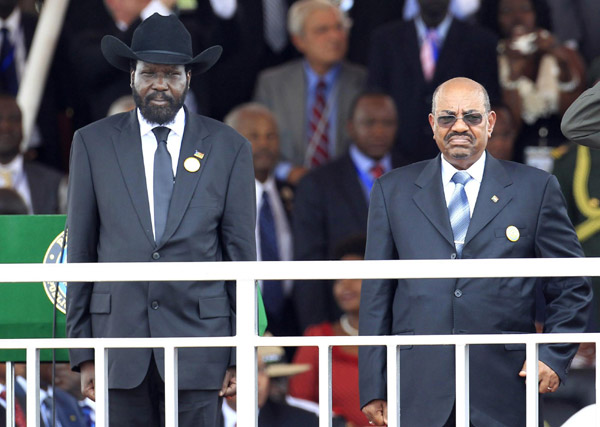South Sudan declares independence
 South Sudan's President Salva Kiir (L) and Sudan's President Omar Hassan al-Bashir attend the Independence Day ceremony in South Sudan's capital Juba July 9, 2011. [Photo/Agencies]
|
JUBA - The Republic of South Sudan declared independence Saturday, waiting to be recognized as the 193rd member of the United Nations and hoping to keep peace with the north after decades of war.
Speaker of South Sudan Legislative Assembly James Wani Igga read the Proclamation of the Independence of South Sudan, sparking wild cheers of hundreds of thousands of people who gathered at the Mausoleum of John Garang, the late leader of the ruling Sudan People's Liberation Movement.
Based on the will of the people of South Sudan, and as confirmed by the outcome of the referendum of self-determination, we "hereby declare South Sudan to be an independent and sovereign nation," Igga said.
The new state would be a multi-ethnic and multi-confessional character, and it is committed to establishing friendly relations with all countries "including the Republic of Sudan", Igga said.
The ecstatic crowd drummed and danced. Many burst into tears when the national flag of South Sudan was hoisted. Slogans of "South Sudan Oyee" and "Freedom Oyee" were shouted repeatedly by hundreds of thousands of people.
Salva Kiir Mayardit took the oath of office as President of the new republic after he signed the Transitional Constitution of South Sudan.
Sudanese President Omar al-Bashir stood beside Kiir to watch the military parade led by the Sudan People's Liberation Army, who had fought decades of war with the Sudanese government troops.
"Finally we are independent. Millions of lives have not been lost in vain," SPLA Chief of Staff General James Hoth Mai told Xinhua. "We want to keep peace with the north and we are confident to guard our people."
"There is no battle in the border areas today although the situation in the contested Abyei region is still tense," he said.
"As a newly founded nation, we want to communicate with all the members of the international community," he said, "We have oil, fertile land and brave people, but we have no skills or infrastructure. We need the world to help us develop from almost zero."
Senior officials including United Nations Secretary General Ban Ki-Moon and representatives from the Arab League, African Union and European Union spoke at the ceremony.
Ban commended in his speech Kiir and Bashir for the "difficult decisions and compromises," but said that Sudan and South Sudan have not yet resolved all of their political issues and the Comprehensive Peace Agreement signed by the two sides in 2005 have not be completed. The status of the contentious border region of Abyei remains unsettled.
"Let their differences be resolved around the negotiating table, " Ban said.
Jiang Weixin, a special envoy of Chinese President Hu Jintao, noted at the ceremony that the birth of South Sudan is the achievement of peaceful process that ended the longest civil war in Africa and successful referendum where Southern people choose independence.
"There are still on-going negotiations on some unsettled issues between South Sudan and Sudan. We believe that the two sides would put peace first and solve the issues through negotiations and consultations based on mutual understanding," he said. "We sincerely hope South Sudan and Sudan would be good neighbors, partners and brothers forever."
Bashir, who saw Sudan's status as Africa's largest country to become history, said Khartoum recognized South Sudan, asserting " the will of the people of the south must be respected."
Bashir pointedly called on marking the independence ceremony for building positive and distinguishing relations and ties binding Sudan and South Sudan. He also praised mediatory efforts have been exerting by African countries and the international community.
Bashir called U.S. President Barack Obama, who said the US formally recognized the new state, to lift sanctions imposed on Sudan.
Public celebrations still continued across Juba as jubilant crowds played music as of Saturday night.
The two rivals north and south had battled two civil wars over more than half a century. The later one, from 1983 to 2005, was the longest civil war in Africa, killing and injuring millions of people. Still more people were forced to fled to other countries.
During the referendum to decide the fate of unity or division of Sudan in January this year, nearly 99 percent of the voters approve the secession of the south from Sudan. The result was recognized by the Sudanese government and the international community, paving the way for the south's independence on July 9.
Despite the public jubilance on the independence day, South Sudan is facing serious challenges on its way of development.
With almost the same size as France, South Sudan has only 100 km of paved roads. The newest country is oil-rich but has no refinery or process industry. Among the total population of 8 million, about 80 percent even do not have access to toilet facility, and nearly a half has access to improved sources of drinking water, according to UN figures.
The human resources are poor as only 70 percent of the population is illiterate. More than 80 percent of women cannot read or write. Few people have skills related to its backbone oil industry.
"We are far behind, we must now commit all our energies to socio-economic development of our country," said Kiir in his speech. "Let us celebrate now but the work of nation building must begin immediately."
He said South Sudan will embrace public-private-partnership in rebuilding the country. The government will prioritize public interest and anyone seeking personal interests will not have a place in it, he said, adding that transparency and accountability will be pivotal.
"South Sudan will not be a failed state," he said.





















